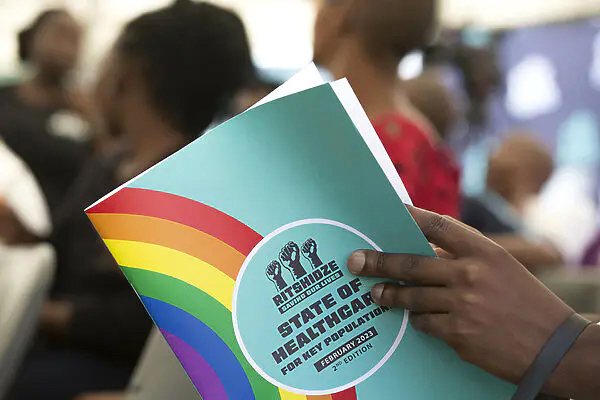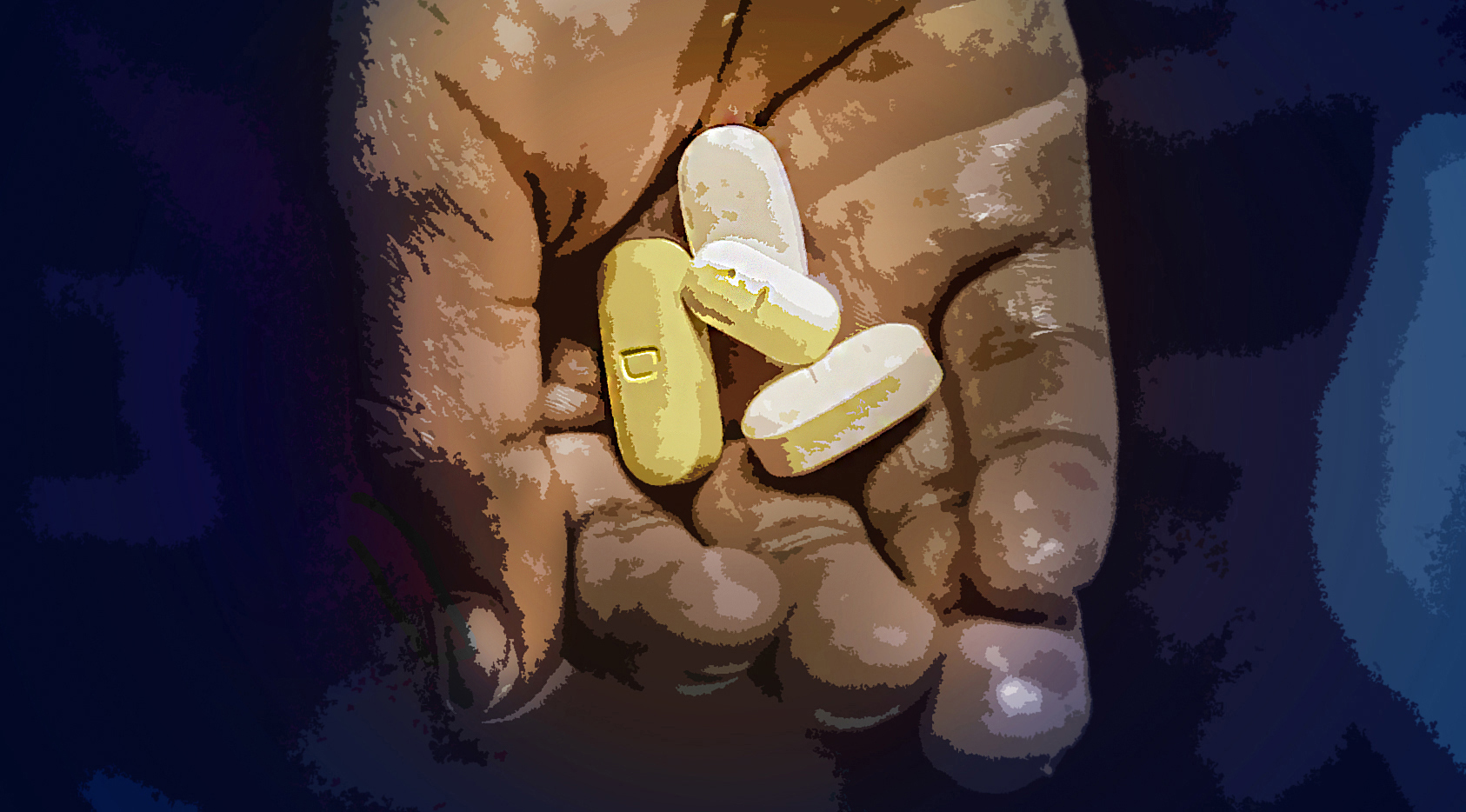Few people feel truly safe and comfortable when trying to access healthcare at a South African public health facility. People who are queer or trans, use drugs or engage in sex work face uncaring, disrespectful, cruel, and even abusive treatment at public health facilities.
A lack of privacy, scarcity of lubricants, and allegedly denying antiretrovirals (ARVs) to key population groups are some of the issues highlighted in the third edition of the Ritshidze State of Healthcare for Key Populations Report.
Released on Thursday 29 February 2024, the report highlights the barriers facing key populations in accessing healthcare at public health facilities.
Ritshidze is a community-led monitoring system developed by organisations representing people living with HIV, including the Treatment Action Campaign (TAC), the National Association of People Living with HIV, and partners.
The report is part of a community-led clinic monitoring project to improve the quality of healthcare services in the public sector.
Read more in Daily Maverick: Ritshidze report shines light on barriers to health services faced by vulnerable populations
Data for the report was collected between July and September 2023 across 24 districts in seven provinces from interviews with 13,832 people who are queer or trans, use drugs, or engage in sex work.
The report defines “key populations” as people living with HIV/Aids, sex workers, people who use drugs, and members of the LGBTQIA+ community.
Cruel treatment
“Frequently, people are laughed at and judged, and, at worst, denied services or chased away. It can be unbearable as this leaves deep scars and ultimately forces some people to stop going to the clinic entirely,” says the report regarding the treatment at public health facilities of people who are queer or trans, use drugs, or perform sex work.
It quotes a gay man about his experience at East London Central Clinic.
He said: “A nurse asked me about my sexuality and then tested me. There were a lot of questions and remarks like ‘how I got the virus, how will I live my life moving forward, what was I expecting, do I know that most gay people die of AIDS, what was I expecting being gay and not contracting the virus and spreading it as ungodly as I am?’
“I wanted to get up and leave. But I needed to confirm my status and start treatment but what was shocking, aside from all the tormenting questions, I did not receive any treatment that day.”
A sex worker who went to Kingsway Municipal Clinic in Ekurhuleni reportedly said she was humiliated.
“I went to the clinic looking for ARVs, and the nurse asked why I bothered them. Why should the government waste money treating people like that instead of giving the medication to the patients who deserve it,” she said.
“I was crying and begging the nurse to help me. She told me to stop prostitution because I will kill people's children with AIDs, and that I disgusted her.”
Read more in Daily Maverick: Key populations still battling to get health needs met despite some healthcare system improvements
A person who uses drugs, who went to Mbunde Clinic in KwaZulu Natal, said it was common for them to be bypassed and even return home without receiving help.
“Even if you arrive early and join the queue, you would get skipped and the nurses would attend to people who came after you. Sometimes we leave without getting the service we went there for,” said the individual.
A transgender man who went to Mbunde Clinic said transgender individuals were subject to mockery.
“In the clinic, they see us trans people as a clown, when a trans woman walks into the clinic, they would all be laughing. They do not take us seriously,” he said.
Lack of privacy
According to the report, 57% of gay people, bisexual people, and men who have sex with men (GBMSM), 61% of trans people, 65% of sex workers, and 74% of people who use drugs, said confidentiality violations were abundant in public health facilities.
“These privacy violations include people’s HIV status being disclosed, or people’s sexuality or gender being revealed, or the fact that someone uses drugs or engages in sex work. It also includes other medical issues being shared either indirectly through more than one person being consulted in the same room, or by staff entering without knocking or calling other health workers in the room, often as a way to mock or judge people, or even security guards checking your medicines as you leave,” read the report.
A gay man who went to Umlazi N Clinic said: “I collect my ARVs at the clinic and there is never privacy. Sometimes there are like three people in the consultation room and everyone can hear what you are discussing. This makes me uncomfortable as I cannot share what is wrong with me in the presence of others”.
A sex worker who went to Rondebult Clinic in Germiston said initially the service they received was poor, but it declined significantly once staff knew they were a sex worker.
“As soon as they found out that I am a sex worker, things got worse… when I get there, they make snide comments… Everyone knew, my privacy was not respected enough”.
Privacy violations create an unsafe and uncomfortable environment to be in that ultimately causes people to disengage from the public health system or to stop accessing health care at all.
“Of people who do not use public health facilities, 38% of sex workers, 47% of people who use drugs, 51% of trans people, and 52% of GBMSM identified privacy violations and unsafe or uncomfortable spaces as a reason,” read the report.
“Of people who stopped receiving any healthcare services, 40% of sex workers, 42% of GBMSM, 42% of people who use drugs, and 66% of trans people cited these same reasons.”
Denial of services is ‘disturbing’
The report notes, “Disturbingly and a major cause for concern is that people across all population groups had been refused health services at the facility in the last year because of being queer or trans, using drugs, or engaging in sex work.”
In this reporting period, 8% of GBMSM, 10% of trans people, 11% of sex workers, and 31% of people who use drugs had been denied services in the last year.
“Being denied services is a humiliating, painful, and unjust experience to go through. While some people may suffer the indignity of trying to get services another time, others can be pushed out of care altogether,” read the report.
Denial of services varied dramatically across provinces and population groups. The highest rate of being denied services for GBMSM was in Limpopo (16%), Eastern Cape (15%) and then KwaZulu-Natal (11%).
For transgender people, the highest rate was in Limpopo (31%), Mpumalanga (18%), and then KwaZulu-Natal (10%).
 Ritshidze is a community-led monitoring system developed by organisations representing people living with HIV. (Photo: Rian Horn / Ritshidze / Spotlight)
Ritshidze is a community-led monitoring system developed by organisations representing people living with HIV. (Photo: Rian Horn / Ritshidze / Spotlight)
For sex workers this was in Limpopo (21%), Mpumalanga (20%), Gauteng (18%), and then the Free State (12%).
All provinces had high rates of denying people who use drugs services with an exorbitant 62% of people having been denied services in the last year in Gauteng, 40% in Mpumalanga, 35% in Limpopo, and 31% in North West.
A person using drugs at Central Clinic in Nelson Mandela Bay said they were denied services and had to self-medicate.
“I was sick and never got to set foot inside the facility because I use drugs. I ended up not getting any services and bought myself Panado. I was chased away by the security guard, who told me the clinic is not a place for “addicts” and I should go get cleaned up first,” the individual said.
The report noted that where people are not treated with compassion, care, and respect, it is not uncommon that they disengage from getting health services at the facility or stop accessing health services altogether.
Scarce services
The report noted that for those who are not deterred by these daily indignities, the services they need might still be unavailable.
“While 92% of sites had external condoms available, only 75% had internal condoms available, and just 28% had lubricant available. Only 46% of trans people, 37% of GBMSM, 37% of sex workers, and 31% of people who use drugs said they could always get lubricant at facilities,” read the report.
Despite its HIV prevention benefits, facilities are failing to inform people about Pre-exposure prophylaxis (PrEP) or offer it to those not living with HIV.
“Fewer people reported ever being offered PrEP at a facility compared to 2022 results, just 29% of GBMSM, 23% of trans people, 19% of sex workers, and 12% of people who use drugs. Further, only 64% of trans people told us they were always able to get PEP (post-exposure prophylaxis), only 45% of sex workers could, and only 36% of GBMSM,” read the report.
Screening for sexually transmitted infections (STIs) is only sometimes available, although untreated STIs are a significantly enhanced risk for HIV transmission and contraction. Only 66% of GBMSM, 59% of sex workers, and 59% of trans people said they could access STI screening services.
Contraceptives are also not always made available to members of key populations. Only 65% of sex workers, 64% of trans people, and 63% of people who use drugs reported being able to access the contraceptives they wanted.
“Alarmingly, of those who were unable to get contraceptives, 32% of respondents were denied them because they were sex workers, 34% were denied them because they are trans, and 46% were denied them because they use drugs,” read the report.
Harm reduction services — like new needles, naloxone, information on safer drug use, methadone, and psychosocial support — are life-saving.
However, they are almost entirely unavailable in primary health facilities in the public sector with only 9% of people who use drugs saying they could get information on where to get new needles from.
The way forward
James Oladipo, from Ritshidze, said there needs to be a culture change in those facilities, or else the ill-treatment and hostility will persist.
“To function effectively, key population-friendly staff members must be recruited to provide a full package of clinical services and the expertise needed,” the report states.
“Urgent and drastic improvement is critical to the public healthcare system to ensure that people who use drugs, sex workers, and LGBTQIA community members are treated with dignity and respect, and can protect their own health and lives.” DM




 Ritshidze is a community-led monitoring system developed by organisations representing people living with HIV. (Photo: Rian Horn / Ritshidze / Spotlight)
Ritshidze is a community-led monitoring system developed by organisations representing people living with HIV. (Photo: Rian Horn / Ritshidze / Spotlight) 